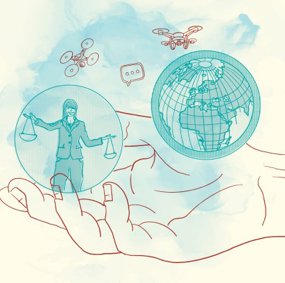This year's leadership forum for research ethics: Security and research cooperation
Several authority initiatives are looking to revise and develop new frameworks for international research cooperation. But how to create a framework for research that safeguards national security, while still facilitating international collaboration?

Today, the national research ethics committees (FEK) invite the heads of research institutions to the Leaders Forum for Research Ethics. This year's theme is international cooperation and security, a theme that has become more relevant this past year, both nationally and internationally. In Norway, several initiatives are currently underway to revise and develop new frameworks for international research collaboration. The topic touches on fundamental values of academic freedom and openness in research, and thus also has many research ethical implications.
– For FEK, it is important to clarify which values and principles are at stake, and to contribute to creating frameworks that continue to facilitate international cooperation, while safeguarding security considerations, says director Helene Ingierd.
Should be part of framework for research ethics
Carthage Smith, head of the Global Science Forum, OECD, is one of today’s speakers. Both Smith and Ingierd have participated in the work on the report Integrity and security in the global research ecosystem.
As head of the secretariat of the Global Science Forum, OECD, Smith has played a central role in the development of the report. He has extensive experience from work with research ethics and at the intersection between research and politics, such as with the International Science Council (ICSU). Work on the OECD-report started around the outbreak of the pandemic in 2019/2020 and ended around the same time as Russia's invasion of Ukraine. Both events illustrate the fundamental and conflicting values addressed in the report: The pandemic shows the importance of international research collaboration to solve major challenges facing the global community; while the war in Ukraine has contributed to a worsening global security situation, where security considerations have become increasingly important.
Smith will also give a presentation at a breakfast seminar for members of the national research ethics committees on the same topic. Some of the recommendations in the report are that safety considerations should be incorporated into the framework for research ethics and form part of the training at the research institutions. Such recommendations are particularly relevant to discuss for the committees, which prepare national research ethics guidelines and assist the institutions in developing resources for research ethics training.
Many actors must contribute
The Leadership Forum for Research Ethics was started in 2018. The goal is to facilitate the exchange of experience and increased awareness of research ethical issues. This year, Ingierd hopes to contribute to both increased and expanded knowledge on how to handle security issues in international research collaborations.
– FEK has been concerned with institutional autonomy in handling such questions. Such autonomy presupposes that the institutions take responsibility by having systems and expertise in place to handle the challenges. At the same time, we see that there are many other actors in the research system who have important roles in safeguarding both academic freedom and collaboration, and security. It is important to set up a dialogue between these actors going forward.